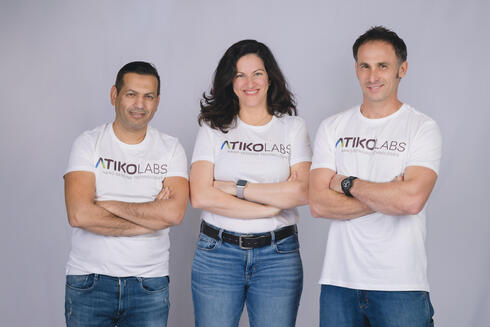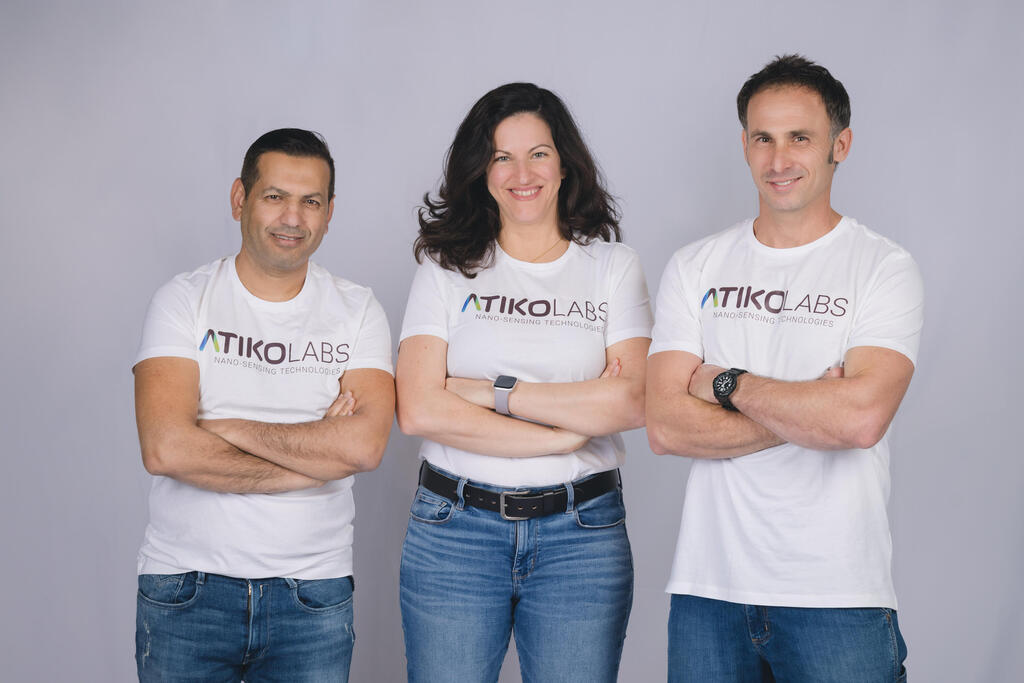
Boarding Pass
This Israeli company has the answer to a $25 billion question
Atiko Labs has raised $2 million to control contamination and ensure the delivery of safe and quality products to consumers within the food and drink sector.
“The food and beverage industry requires contamination detection technology that is both extremely rapid and highly accurate to fit directly into the manufacturing process,” explained Atiko Labs. “This need stems from a significant gap in the current market.”
According to the company, the lack of such a solution highlights a significant opportunity for innovation in the food safety sector: A contamination detection technology that can achieve accuracy and speed would change the $25 billion contamination detection market within the food and beverage sector.
Atiko Labs, founded in 2023, specializes in nano-sensing technologies, aiming to revolutionize material analysis by introducing an accurate, quick, and portable solution for molecular detection on-site.
“A truly rapid and accurate contamination detection solution wouldn't just solve a problem – it would reshape the entire food and beverage industry, prioritizing safety, efficiency, and sustainability on an unprecedented scale,” it added.
You can learn more about the company below.
Company Name: Atiko Labs
Sector: Deeptech/Material Sensing
Product/Service description:
In the fast-paced food and beverage industry, ensuring product quality while maintaining efficiency is a critical challenge. Atiko is introducing a solution that aims to revolutionize contamination detection, helping manufacturers to bridge the gap between quality and speed.
Today, food and beverage manufacturers rely on slow tests and outsourced labs to perform quality control and follow regulation, during which time, manufactured products must wait until results come back, resulting in slower processes and shorter shelf-lives for the goods.
Our product leverages advanced technology to provide on-site, real-time, highly accurate detection of contamination, ensuring the highest levels of food safety without disrupting the manufacturing process. With superior sensitivity and accuracy, it minimizes the risk of contaminated products reaching consumers. This not only safeguards brand reputation but also complies with stringent regulatory standards.
Founder Bios:
In their childhood years, Atiko founders Asaf Kol and Hadar Tevet formed a bond that would last a lifetime. Growing up together in Kibbutz Yagur, they shared a mutual understanding that their paths were destined to cross in pursuit of great endeavors. Before co-founding Atiko, Asaf's experience spans 15 years in real estate, where he navigated the complexities of working with investors, contractors, and various government entities. Hadar, on the other hand, honed her skills in project management for industrial organizations, gaining experience in information systems.
The search for suitable technologies led them to meet with Prof. Mohammed Bashouti, a faculty member in Ben Gurion University’s Environmental Physics Department. Bashouti holds a Ph.D. from the Technion and did his post-doctoral studies at the Max Planck Institute in Germany before joining Ben Gurion University. Upon presenting his research and the potential applications it became clear that there was a shared vision, and Prof. Bashouti joined the founding team.
Year of Founding: 2023
Last Investment Round: $2 million
Last Investment Stage: Pre-Seed
Date of Last Investment: November 2023
Total investment to date: $2 million
Investors: Earth & Beyond Ventures, IIA
Current number of employees: 5
Open positions: Stay tuned
How was the idea born?
Asaf and Hadar, though not farmers by profession, have always held a profound appreciation for agriculture, rooted in their kibbutz upbringing. This perspective allowed them to notice a critical disconnect: the world of food production is vastly underserved by technological innovation. Driven by a passion for bringing cutting-edge solutions to this vital sector, they explored various technological advancements to revolutionize how we approach food safety and quality.
What is the need for the product?
The food and beverage industry requires contamination detection technology that is both extremely rapid and highly accurate to fit directly into the manufacturing process. This need stems from a significant gap in the current market:
The lack of such a solution highlights a significant opportunity for innovation in the food safety sector: A contamination detection technology that is both highly rapid and remarkably accurate would revolutionize the food and beverage market in several ways:
- Enhanced Consumer Safety and Trust: The most fundamental change would be a significant improvement in food safety. Immediate and reliable detection of contamination would greatly reduce the instances of contaminated products reaching consumers. This would translate into fewer foodborne illnesses and build a much stronger sense of trust between consumers and food brands.
- Reduced Recalls and Waste: Companies would be able to pinpoint contamination events with much greater precision. This would drastically reduce the scale of product recalls, preventing vast quantities of perfectly safe food from being needlessly destroyed. This could lead to huge cost savings and positive environmental impact.
- Operational Efficiency: Inline, real-time detection systems would eliminate the need to hold batches for time-consuming laboratory testing, streamlining the production process, improving speed and efficiency, allowing products to move to the market faster, and maximizing freshness.
- Competitive Advantage: Companies adopting this cutting-edge technology would gain a significant competitive edge, as they would be able to market their products with strengthened safety and quality claims, increasing consumer appeal and brand loyalty.
- Evolving Regulatory Landscape: The high-accuracy and rapid speed of this technology has the potential to become a benchmark product, which could impact how regulatory bodies adjust standards and compliance protocols. Companies failing to quickly implement this new standard would likely face tougher scrutiny and potential disadvantages.
- Innovation Drive: The emergence of such a technology would foster an innovation surge in the food safety sector. Companies would invest in developing complementary technologies, such as advanced traceability systems, creating a more robust and transparent food supply chain.
A truly rapid and accurate contamination detection solution wouldn't just solve a problem – it would reshape the entire food and beverage industry, prioritizing safety, efficiency, and sustainability on an unprecedented scale.
How is it changing the market?
Atiko Labs specializes in nano-sensing technologies, aiming to revolutionize material analysis by introducing an accurate, quick, and portable solution for molecular detection on site. The company has developed a state-of-the-art deeptech optical solution designed to detect any compound or contamination in samples taken directly from the production line. This solution uses intensity-enhanced nanostructures for high specificity and selectivity, offering high-resolution detection with accurate, quantitative results within seconds. Atiko's solution includes a disposable, one-time-use sensor, combined with a portable RAMAN spectrometer device, designed to provide quick and accurate results on-site by requiring just a single drop of liquid sample.
As a first target, the company is focusing on the food and beverage industry, offering solutions to control contamination and ensure the delivery of safe and quality products to consumers. By enabling on-site and real-time testing, Atiko Labs' technology allows for immediate decision-making, potentially saving valuable shelf life time for products and enabling raw materials to be tested for contamination without quarantine, thus demonstrating wide-ranging applications and benefits.
How big is the market for the product and who are its main customers?
The market for rapid and accurate contamination detection technology in the food and beverage industry is enormous and growing. Estimates vary slightly, but most analyses project the global food safety testing market, of which contamination detection is a major component, to surpass $25 billion by 2027-2028. This indicates massive growth potential as the need for rapid and reliable solutions intensifies.
Factors Driving Market Growth:
- Stringent Food Safety Regulations: Governments worldwide are tightening regulations on food contamination, driving the need for more effective detection systems.
- Globalization of Food Supply: Longer and more complex supply chains increase the risk of contamination incidents, bolstering the demand for reliable monitoring.
- Consumer Awareness: Consumers are more conscious of food safety issues, and demand transparency, fueling the industry's move toward prevention technologies.
Does the product exist already? If not - at what stage is it and when is it expected to hit the market?
The technology on which the product is based is robust and proven and was validated both in and out of the lab setting. The company is currently working to build a viable product based on fundamental innovation and current POC. We are expecting to begin POCs with the industry in the coming year and to launch full commercial sales to the food and beverage industry by the end of 2025.
Who are the main competitors in this sector and how big are they?
The competitive landscape in the food safety testing sector includes a variety of companies, from large, established corporations to specialized startups. The larger corporations typically have extensive product portfolios that cover a wide range of testing equipment, including advanced laboratory-based analysis systems and inline solutions. These companies are characterized by their legacy technologies, their long R&D iterations, and complex operations.
What is the added value that the founders bring to the company and the product?
Prof. Bashouti is a leading researcher in the field of optoelectronics. His trailblazing academic work on plasmonic materials and nano-surfaces has laid the foundation for Atiko’s approach. Mohammed is a firm believer in equal opportunities and the group of students working with him in his lab at Ben-Gurion University is living proof.
Atiko Labs' founders demonstrate an intimate understanding of food processors and manufacturers. They can grasp customer desires and pain points, crucial for designing solutions that gain genuine adoption. Their motivation stems from identifying limitations in existing testing technologies, driving their pursuit of improved speed, accuracy, and ease of use. Their location within Israel's tech hub could expose them to technologies from other sectors adaptable to innovative food safety applications.
The founders' experience in project management likely fosters a resourceful problem-solving mindset, essential for developing complex technology in real-world conditions. A potential "underdog" mentality could fuel their disruptive drive, challenging the status quo of food safety testing methods.
What will the money coming in from the round be used for?
The upcoming funding round will be strategically allocated to key areas crucial to Atiko's growth and market readiness. A significant portion will accelerate R&D efforts, focusing on finalizing product development, refining detection algorithms, and conducting comprehensive validation tests to surpass current industry standards. The company will also invest in recruiting top talent, including engineers, food scientists, and data analysts, essential for driving our technological innovation forward. Moreover, the investment will cover regulatory compliance costs, and support pilot projects with food manufacturers to showcase the technology's integration and effectiveness.
In the "Startup Boarding Pass" section, CTech will cover the (relatively) small investments made in companies during the early stages of their existence - and the entrepreneurs and startups who have not yet had the opportunity to reveal their stories to the world. Please use the linked form and fill it out according to the guidelines. This form is intended for startups raising between $500,000 and $3 million from venture capital funds, angels, or official grants from Israeli and foreign institutions. If relevant, someone at CTech will be in touch for follow-up questions.














